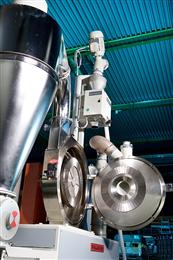
31 Aug 2011
Clariant calls on Pallmann mills for masterbatch production
Shanghai, China (August 31, 2011) – Clariant Masterbatches is a major producer of masterbatches, with a strong reputation in safety and process excellence. Grinding equipment from leading producer Pallmann provides important assistance in this task. Pallmann mills are different from the competition: they can easily and efficiently handle all the main polymers by Clariant Masterbatches without the need for special cooling with liquid nitrogen. This decrease substantially boosts efficiency, without negatively affecting the quality for the application needed.
The decision to grind most of polymers internally is based on 3 considerations
• Ownership in terms of safety of the polymers for assuring food approval/FDA or other regulations which are more frequently required by the market
• Flexibility of fast delivery to customers; service business requires 5-10 days
• Increasing efficiency and optimizing processes
With a production volume of several thousand tonnes/year, polyethylenes are by far the predominant proportion of high-quality powders it makes at its Italian plants Merate and Pogliano just outside of Milan. Clariant also grinds thermoplastic polyesters (PET), polypropylene (PP) and polyamides (PA) for masterbatch applications.
"Our most important machines are six Pallmann PKM 600 and 800 mills, with capacities of 450 to 1200 kg per hour", says Clariant Masterbatches production manager Maurizio Brzuszkiewicz.
Quality is what matters above all else for Clariant, with it and its customers placing high demands on the masterbatches. Brzuszkiewicz says: "For PP and PA, very often particle sizes of less than 400 microns for special applications and very narrow size distributions are needed."
In order to meet the stringent requirements – as well as to guarantee optimum quality and throughput of new materials without additional cooling - Clariant used the world's largest size reduction testing centre, in the technology laboratory at Pallmann’s headquarters in Zweibrücken. Various preliminary tests were carried out, especially on blade shapes and blade clearance settings, to optimize them for specific customers and materials. Bulk density, fineness, particle shape and flowability of the milled material can exert a decisive influence on the quality of the final product.
In addition to product quality, costs are critical to market success. This is achieved through, among other things, low equipment maintenance cost, low specific energy consumption (no nitrogen cooling above all) and the productivity of the mills.
"Maintenance essentially means sharpening the knives,” says Brzuszkiewicz. “We do that on average every 1500 hours, with PP and PA it’s rather more often." Other maintenance operations are very rare - this applies equally when new materials are being processed, which speaks for the robustness and versatility of the plant, as well as for its cost-effectiveness.
Now, with its new Polygrinder, Pallmann has also launched a new mill onto the market that offers a variety of additional application advantages. In particular, the range of materials that can be ground to a high quality without nitrogen cooling has been extended to include such complex materials such as ethylene vinyl alcohol (EVA) with high VA content. The Polygrinder can also handle a polypropylene copolymer that cannot be processed on any other commercially available mill.
Reader enquiries
PallmannWolfslochstraße 51
66482 Zweibrücken
Germany
+49 6332 802 0
rolf.gren@pallmann.eu
www.pallmann.eu
Notes for editors
The Pallmann Group
Founded in 1903 as an engineering works, Pallmann is a medium-sized family-owned enterprise that has a history covering seven generations of millers and millwrights. Now a global company, the Pallmann Group has specialized in size reduction and processing technology in various sectors. It numbers more than 1000 machine types in what is the world's largest range of size reduction equipment for all materials ranging from soft to medium-hard, brittle to tough, as well as fibrous products.
Worldwide, the group employs around 700 experienced and highly qualified staff. Its own engineering works, subsidiaries, contract grinding and sales offices in Europe, North and South America, Asia and China ensure the best service, expert advice and support in planning, installation, commissioning of plant and equipment, and supply of spare parts.
To find out more about The Pallmann Group please visit www.pallmann.eu.
